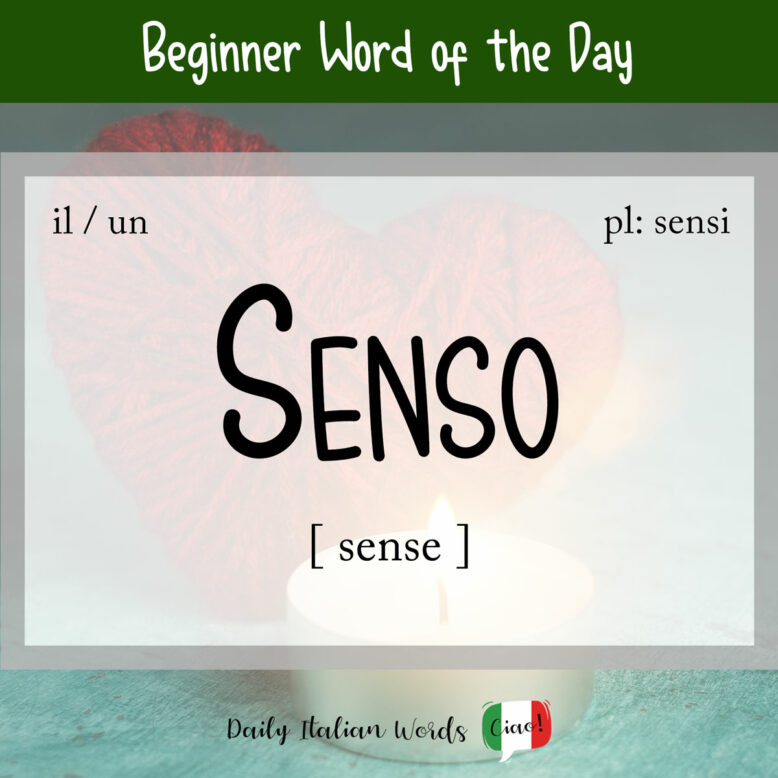Today’s word of the day is senso which is a noun that derives from the Latin sensus meaning ‘faculty of thought, feeling and meaning’.

Senso is masculine, and the plural is sensi. The definite and indefinite articles it takes are as follows:
il senso
the sense
un senso
a sense
i sensi
the senses
dei sensi
(some) senses
Senso has multiple meanings in Italian, so let’s begin with the translation that English speakers will be able to grasp most easily, which is sense.
In both languages, we can talk about i cinque sensi (the five senses) which are:
- l’olfatto = smell
- il gusto = taste
- il tatto = touch
- l’udito = hearing
- la vista = sight
Oggi a scuola, abbiamo imparato i cinque sensi.
Today at school, we learned about the five senses.
Many people, be it true or not, also claim to be in possession of a so-called sesto senso (sixth sense).

There is also some overlap when senso refers to a person’s keen awareness or sensitivity to the importance or presence of something, as in un senso di responsabilità (a sense of responsibility), buon senso (common sense) or senso dell’orientamento (sense of direction). Un senso di colpa translates as a sense of guilt.
In its plural form sensi, it is often used to mean consciousness. If you are privo di sensi (lit. without your senses), you are unconscious. Likewise, perdere i sensi (lit. to lose one’s senses) means to lose consciousness. For the expression riprendere i sensi, which means to regain consciousness, there is an exact equivalent in English, which is to come to one’s senses.
Another possible meaning limited to the plural form is sensuality or sensual (e.g. i piaceri dei sensi = sensual pleasures).
Senso can also signify meaning in both languages, and in fact, a very common question you will hear Italians ask is In che senso? which means What do you mean? or more literally, In what sense?
Trovo che sia una persona ingenua. – In che senso “ingenua”? A me sembra abbastanza astuto invece…
I find him to be a naive person. – What do you mean “naive”? He seems quite astute to me…
Senza senso (lit. without sense) is how you would say senseless or meaningless. Doppio senso for a word or phrase means that it has two meanings.
Another possible meaning for senso in Italian is feeling or sensation. For example, a sensation of nausea would be un senso di nausea whereas a feeling of peacefulness would translate as un senso di pace. In this case, you could also use the synonym sensazione.

Sometimes senso translates as way, especially when used in the expressions in questo senso (in this way) and in quel senso (in that way). We also have in un certo senso which is the equivalent of in a way.
In un certo senso, siamo soci io e te.
In a way, you and I are partners.
Senso can also mean way as in direction, as in the following example phrase:
Occhio! Questa via è a senso unico.
Careful! This is a one-way street.
Here are a few other expressions in which senso means way or direction, most of which are related to the road and driving:
- senso unico = one-way
- doppio senso = two-way
- senso vietato = wrong way
- senso di marcia = direction of traffic
- senso orario = clockwise (“in the direction of the clock”)
- senso antiorario = counterclockwise

A common way in which Italians introduce a clarification or elaboration on something that’s already been said is by using the expression nel senso (che) which means in the sense that or meaning that.
Beh, non saprei cosa dirti, nel senso che non so assolutamente nulla di questa faccenda.
Well, I don’t know what to tell you, in the sense that I know absolutely nothing about this matter.
To end off, let’s take a look at two very common expressions in Italian that learners frequently confuse: avere senso and fare senso.
avere senso
Avere senso means “to make sense“, even though the literal translation would be ‘to have sense’.
Ha senso. = It makes sense.
Non ha senso. = It doesn’t make sense.
fare senso
Although fare senso literally translates as ‘to make sense’ it actually means “to disgust” or “to gross out“.
Fa senso! = It’s gross!
Mi fa senso! = It grosses me out!
Non mi fa senso. = It doesn’t gross me out.
Heather Broster is a graduate with honours in linguistics from the University of Western Ontario. She is an aspiring polyglot, proficient in English and Italian, as well as Japanese, Welsh, and French to varying degrees of fluency. Originally from Toronto, Heather has resided in various countries, notably Italy for a period of six years. Her primary focus lies in the fields of language acquisition, education, and bilingual instruction.


